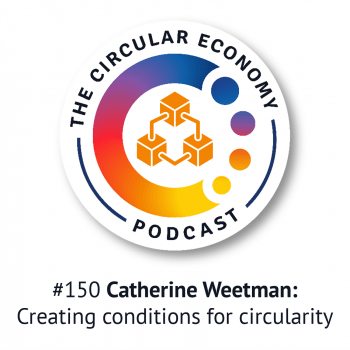150 Catherine Weetman: Creating conditions for circularity
Circular Economy Podcast

Catherine Weetman has been reflecting on what’s come up over the last series, in episodes 141 to 149. How do we create the conditions for our ideas to spread? Do we fully understand the systems that circular products or services will be embedded in or affected by, how those work, and what keeps them going?
It’s likely there will be multiple systems, and some of these will be cultural, invisible and hard to disrupt. How much can you change? Could you create a new system that integrates with what’s already there?
We also look at who you need to convince – your target customers might have a wide range of characteristics and motivations, and they probably want approval – even permission – from colleagues, family or friends. Often, you’ll need to convince other parties – supply chain partners, distributors, investors, employees and more. What’s the value proposition to them? What pain points are you relieving, and what benefits can you offer?
Some circular solutions can solve multiple, disparate problems, either by design or from beneficial side-effects. Are you making this clear, and could it help you get more buy-in, attention and support?
The last series covers episodes 141 to 149:
149 Giulia Ziino of CircularPlace: generate value from underused assets
148 Tim Forslund of Sitra: circular solutions for nature
147 Dr Alexandra Leeper of Iceland Ocean Cluster: smarter ways to create value
146 Dr Monika Hauck of Repair Rebels: Making repairs easy & fashionable
145 Evolena de Wilde of Faircado: your AI-powered second-hand shopping assistant
144 Chris Allen of Decathlon: ever-evolving circular design
143 Michael Colarossi of Avery Dennison – Digital Product Passports
142 Anna De Matos of Iceland Tool Library – igniting circular communities
141 Joel Tasche of CleanHub: scaleable solutions to plastic pollution
